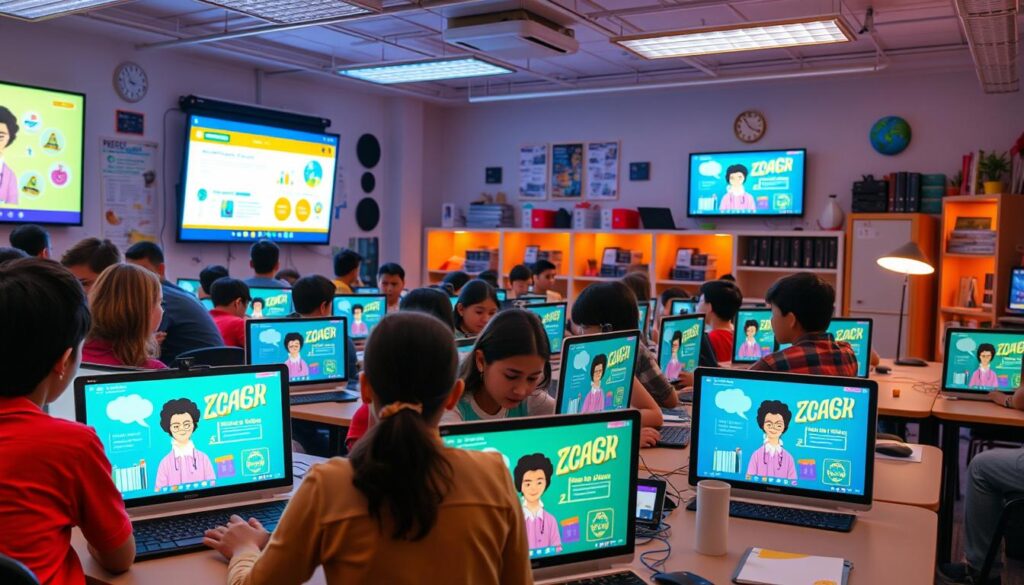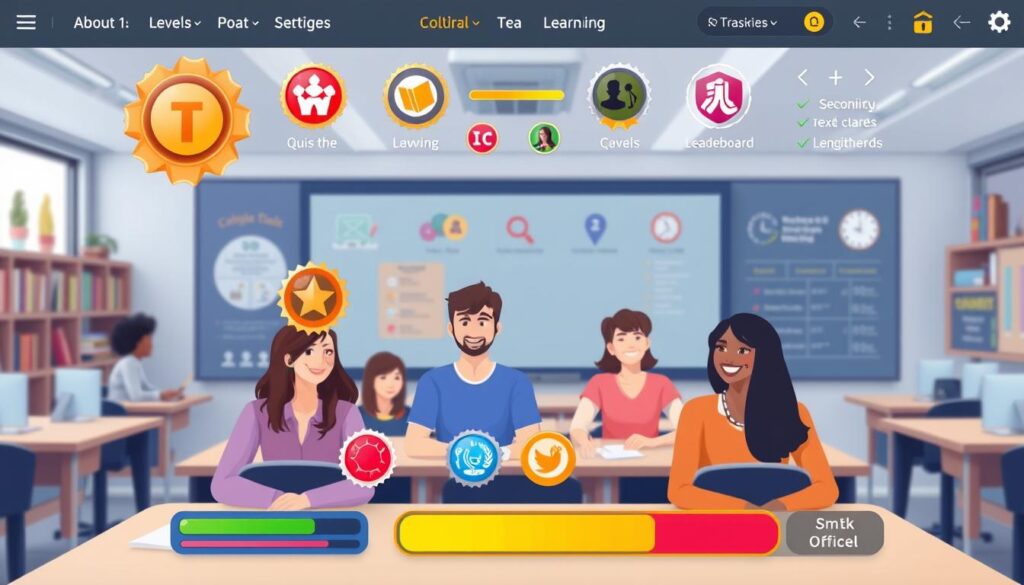Online education is changing fast, and keeping learners motivated is a big challenge. A study by the University of Florida found that 70% of students in virtual courses struggle to stay engaged and motivated.
This guide offers top tips for keeping learners motivated in online education. We’ll look at the latest research and expert advice. You’ll learn how to boost engagement, improve learning, and create exciting virtual classrooms in 2024 and beyond.
Key Takeaways
- Understand the psychology behind online learning motivation and its key drivers
- Discover essential components of self-regulated learning in digital spaces
- Learn research-based tips for implementing effective engagement strategies
- Explore the power of gamification to enhance learning engagement
- Leverage adaptive technology to personalize learning paths and improve motivation
- Build thriving online learning communities to foster a sense of belonging
- Stay ahead of the curve with the latest trends and best practices for 2024
Understanding the Psychology Behind Online Learning Motivation
To keep online learners engaged, we must explore the psychological factors that motivate them. We need to understand how intrinsic and extrinsic motivators work together. We also have to consider the role of social connections and how to manage cognitive load. By doing so, we can make learning experiences that truly capture our audience’s attention.
The Role of Intrinsic vs. Extrinsic Motivation
Intrinsic motivation comes from a genuine desire to learn and grow. It’s a strong force in online education. By tapping into learners’ curiosity and passion, we can encourage deeper engagement and more meaningful learning.
At the same time, we should use extrinsic motivators like rewards and recognition wisely. This balanced approach meets the needs of different learners.
Impact of Social Connection on Learning Drive
The neuroscience of online learning shows that social connection is crucial. Building a sense of community and belonging boosts learners’ motivation. By adding interactive elements like discussion forums and virtual study groups, we can create a supportive online learning space.
This environment allows learners to use self-regulated learning techniques effectively. It helps them stay motivated and engaged.
Cognitive Load Management in Virtual Environments
Creating effective online learning experiences means finding the right balance. We need to challenge learners without overwhelming them. By applying cognitive load theory, we can design activities that enhance information processing.
Using strategies like chunking content and providing clear instructions helps. Adding multimedia elements also ensures learners can focus on the material without feeling overwhelmed.
Essential Components of Self-Regulated Learning in Digital Spaces
Online education is becoming more popular, and self-regulated learning is key for success. Learners need to develop skills like time management, goal-setting, and self-assessment to stay motivated and do well.
Time management is crucial for online students. They must create good routines and schedules. This ensures they have enough time for schoolwork, studying, and personal activities. It’s important to learn how to focus and avoid distractions to reach your goals.
Setting goals is also vital in online learning. Learners should aim for specific, measurable, and achievable goals that match their educational dreams. Regularly checking on these goals helps students stay focused and feel like they’re making progress.
- Cultivate self-awareness: Understand your learning preferences, strengths, and areas for improvement.
- Leverage self-monitoring techniques: Use tools like checklists, journals, or productivity apps to track your progress.
- Seek feedback and support: Engage with instructors, peers, or online communities to receive guidance and encouragement.
By learning self-regulated learning techniques, online students can take charge of their education. They can grow, achieve their goals, and make the most of digital learning. Adopting these strategies is essential for success in online environments.
How to Keep Learners Motivated in Online Education: 2024 Research-Based Tips
Keeping learners motivated in online classes is a big challenge today. Luckily, new research has found ways to keep your students engaged and excited. Let’s explore three tips backed by research to boost e-learning motivation in 2024.
Implementing Evidence-Based Engagement Strategies
To make e-learning fun, add interactive elements that excite your students. Use videos, games, and live chats. This makes learning a fun adventure and keeps students interested.
Creating Achievable Milestones
Setting small, achievable goals is essential. Break down big topics into smaller steps. Celebrate each success to keep students motivated and positive.
Utilizing Progress Tracking Tools
- Use tools to track student progress and give feedback.
- Tools that show growth help students feel in control of their learning.
- Check progress data often to improve teaching and help students.
By using these tips, you can make online learning exciting and empowering. Your students will thrive in the digital world.

Leveraging Gamification for Enhanced Learning Engagement
In today’s digital world, gamification is a key tool to grab and keep online students’ attention. It adds game-like features to online courses. This makes learning fun and engaging, boosting gamification in online courses and online student engagement.
Understanding what motivates learners is crucial for gamification success. Clear goals, quick feedback, and a feeling of moving forward keep learners interested. Gamification uses our natural drive for success, competition, and connection. It turns passive learning into an active and fulfilling journey.
- Use points, badges, and leaderboards to make students feel accomplished and competitive.
- Add interactive challenges and mini-games to let learners use their knowledge in a fun way.
- Give virtual rewards, like unlockable content or personalized avatars, to encourage more participation and active learning.
Online educators can make learning exciting and motivating with gamification. As students tackle harder tasks and reach important goals, they feel more engaged and accomplished. This leads to better retention of knowledge and higher academic success.

Personalizing Learning Paths Through Adaptive Technology
Online education is changing fast, thanks to adaptive technology. It keeps learners motivated and engaged. Educational platforms use the neuroscience of online learning to create learning paths that fit each person’s needs and preferences.
AI-Powered Learning Recommendations
Imagine your online coursework changing to fit your strengths and learning style. AI-powered learning recommendations make this possible. It uses algorithms to suggest content and activities that match your learning journey.
Custom Pacing Strategies
Everyone learns differently, and traditional methods don’t always work. Adaptive technology lets you learn at your own pace. It adjusts to your speed, so you’re never too fast or too slow.
Individual Goal Setting Frameworks
- Personalized learning paths let you set your own goals and milestones, keeping you motivated and focused.
- The system breaks down big goals into smaller steps, celebrating your achievements.
- Aligning your learning with your personal goals gives you a sense of purpose and satisfaction.
Adaptive technology is changing education with personalized learning paths and insights from the neuroscience of online learning. Start a learning journey that fits you and reach your full potential.
Building Effective Online Learning Communities
Online education is changing fast. Building a strong community can really boost learner motivation and engagement. By using tools for peer collaboration and virtual classroom strategies, you can create a supportive space. Here, students feel connected, empowered, and inspired to do their best.
It’s key to encourage students to talk to each other online. Use discussion forums, group projects, and virtual study sessions for them to share ideas and solve problems together. These peer collaboration tools help build a sense of friendship and shared goals, making learning more fun.
Also, making your virtual classroom strategies engaging can really motivate learners. Add interactive features like live Q&A, breakout rooms, and collaborative whiteboards to your virtual classroom. This makes the learning space lively and engaging. When students get to participate and share their thoughts, they become more curious and invested in the course.
FAQ
What are the key psychological factors that influence online learning motivation?
Online learning motivation comes from both inside and outside factors. Social connections and managing information in virtual spaces also play big roles.
How can I develop self-regulated learning skills for success in online education?
To succeed online, focus on managing your time, setting goals, and checking your progress. These skills help keep you motivated and on track.
What are some evidence-based strategies for keeping learners engaged in online courses?
To keep learners interested, use fun strategies, set reachable goals, and track progress. These methods boost motivation and success in online classes.
How can gamification enhance learning engagement in online education?
Adding game elements to online learning makes it more fun. It encourages competition and rewards students for their efforts.
How can personalized learning paths and adaptive technology improve online student engagement?
AI helps tailor learning to each student. This approach keeps learners engaged and motivated by focusing on their unique goals.
What strategies can I use to build effective online learning communities?
Encourage teamwork, lead meaningful talks, and create a supportive space. These steps boost motivation and engagement among online students.
